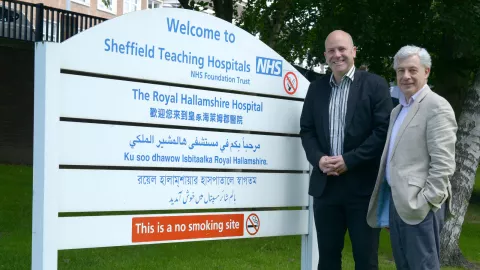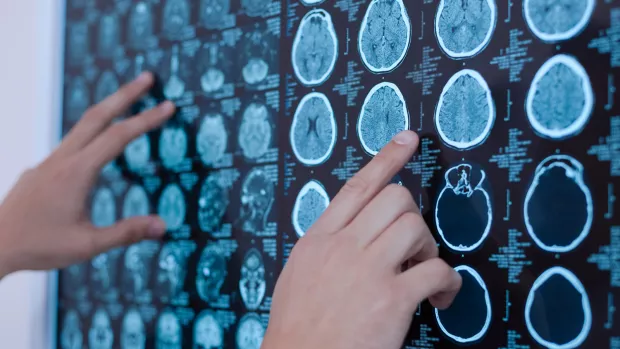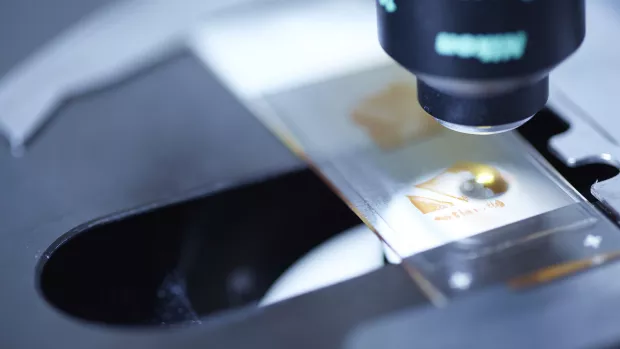
StarMS HSCT trial opening at hospitals around the UK
The StarMS trial is comparing HSCT (haemotopoietic stem cell transplantation) with other highly effective treatments for relapsing MS. HSCT is a treatment for MS that involves using chemotherapy to remove harmful immune cells. Your own stem cells are then used to regrow the immune system.
StarMS is a phase 3 trial, led by Professors John Snowden and Basil Sharrack at Sheffield University, and Professor Paulo Muraro at Imperial College London. It’s comparing the safety and effectiveness of HSCT with four other disease modifying therapies (DMTs).
Recruitment opened in Sheffield earlier this year. And they’re now enrolling people with MS at hospitals in London, Southampton and Nottingham too. Sites in other parts of the country are due to open soon.
See the full list of sites on the StarMS website
Why is this trial needed?
So far, we’ve only had results from one large randomised controlled trial (the gold standard for research) for HSCT. That was the MIST trial which compared HSCT with DMTs available at the time like beta interferon and glatiramer acetate. So we don’t know how it compares to newer, highly effective DMTs.
Dr Sarah Rawlings, our Executive Director of Research and External Affairs, said:
“HSCT can be life-changing and some people with MS see their symptoms stabilise or even improve after receiving it. We currently don’t know enough about the benefits or safety of HSCT compared to other disease modifying therapies that are also highly effective but, like HSCT, can come with serious side-effects.
“The evidence from StarMS will provide vital information for people considering treatment options. At the moment, NHS eligibility criteria are strict and availability in the UK limited.
"The trial itself should help a larger number of people with MS get HSCT. And in the longer term, knowing how the treatment compares to other very effective treatments could give clinicians extra confidence to recommend it. It could also convince the NHS to make it more widely available across the UK. That would make it easier for people who could benefit to get treatment.”
How does the trial work?
People taking part in the trial will be randomly assigned to have either HSCT or one of the other DMTs:
The team will be looking at whether people have what’s called ‘no evidence of disease activity’ after two years. That means no new relapses, no new MRI lesions and no worsening of disability.
Who can take part?
The trial needs 198 people with relapsing MS to take part. To be eligible, you need to either:
- Be taking a DMT and have had a relapse, or MRI activity in the past year can be seen on your MRI scans
or
- Have ‘rapidly evolving severe relapsing MS’ and aren’t taking a DMT. This usually means you’ve had two or more disabling relapses in the past year and MRI scans show you have more, or bigger, lesions
There are also other eligibility criteria, like being aged between 16 and 55.
The trial team are advising anyone interested in taking part to contact their neurologist.
Take the eligibility questionnaire on the StarMS website
Why can’t people with progressive MS take part?
Some people with progressive MS have found HSCT has helped them. And evidence from real-world observational studies has also shown benefits for some people with progressive MS.
But researchers think HSCT is likely to be less effective in progressive MS than relapsing MS, especially for people without active inflammation. So to detect a difference in a trial, you’d need to recruit a lot more people and follow them for longer.
At the moment, the UK doesn’t have the resources to run an HSCT trial that large. StarMS is helping more hospitals around the country get set up to give HSCT to people with MS. And a number of trials are testing other treatments for people with progressive MS.
Research we're funding
We're currently funding an add-on study to StarMS. Dr Sharmilee Gnanapavan from Queen Mary University London is exploring how HSCT affects nerves. She's looking at a marker of nerve damage in MS called neurofilaments. She'll compare the levels of neurofilaments in HSCT versus the other four DMTs.




